College of Science, Engineering & Technology
Women's Month: Celebrating female researchers in CSET
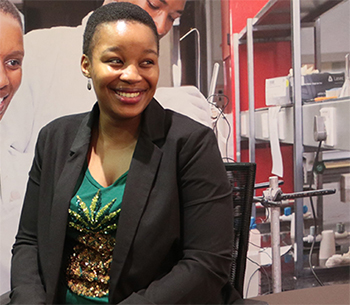 Nozipho Gumbi, PhD student in the Nanotechnology and Water Sustainability (NanoWS) research unit, tells Unisans what makes her tick.
Nozipho Gumbi, PhD student in the Nanotechnology and Water Sustainability (NanoWS) research unit, tells Unisans what makes her tick.Give us a brief educational background about yourself.
During my high school years, I took maths and physical science as two of my main subjects. I believe this ignited my love and passion for the sciences, and motivated my choice to continue studying science, and in particular chemistry during my years of tertiary education.
In 2006, I moved to Johannesburg, to study towards a National Diploma in Analytical chemistry at the University of Johannesburg. It was here that I met Dr Bhekie Mamba, now Executive Dean of Unisa’s College of Science, Engineering and Technology (CSET), and one of my PhD supervisors.
At the time, he was my Organic Chemistry and Polymer Chemistry lecturer, who saw great potential in me during my undergraduate studies, as I was a top performer who collected many awards during annual prize-giving ceremonies. He was the one who motivated me to pursue postgraduate studies. The rest is history! I am now a Doctor of Philosophy (PhD) student at Unisa in the Nanotechnology and Water Sustainability (NanoWS) research unit and my research interests include membrane technology, nanomaterials engineering, and water-treatment processing.
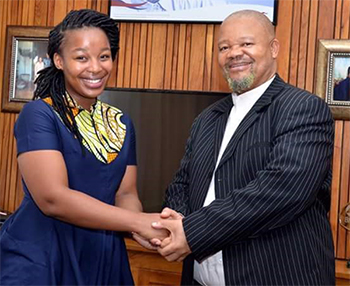
Nozipho Gumbi is congratulated by Prof. Mandla Makhanya (Principal and VC) after representing South Africa at the FameLab international finals in the UK, where she made the top ten.
What are your research highlights?
Since I began my research journey, I have been fortunate to win several prestigious awards including Best Speaker Award in the SANi NanoAfrica Conference 2014, FameLab South Africa 2016 overall winner, top ten FameLab International finalist 2016, 2016 South African Women in Science Award, which was accompanied by a TATA Africa Scholarship for Women in Science, Engineering and Technology.
I was also selected as one of the Mail & Guardian’s 200 young South Africans for 2016 in the field of science. In addition to this, I have received the DAAD Scholarship Award to pursue part of my PhD studies at a German University of choice, which allowed me to spend six months at the Karlsruhe Institute of Technology in Germany.
You recently attended, presented, and won at the African Membrane Society International Congress (AMSIC-2). What are your thoughts? What has this meant for you?
I was extremely honoured and happy to have won the Best Presenter Award (1st prize) at the AMSIC-2 conference held at Unisa. This was a very special award to me since I won it for a presentation where I was assessed by an international audience that comprised various experts in the field of membrane science and technology. This was affirmation that we are indeed on the right track and on par in terms of the research work on membrane technology that we are doing and that it resonates with what others are doing in various parts of the world.
What inspires you?
The fact that I haven’t yet achieved my life goals—one of them being obtaining my doctoral degree—gets me up every morning and I want to give it my best shot in order to get one step closer to achieving my dreams. Also, seeing others (my peers and those ahead of me) going on to do amazing things in their academic careers and getting recognised locally and internationally for those things, inspires me greatly.
What factors influenced you to choose this career path?
The very first thing was the fact that I used to do very well in physical sciences, and always obtained good marks. I was also fortunate that I had teachers who encouraged me to pursue science-related undergraduate studies. Then, as I went on to undertake my undergraduate studies, I was fortunate enough to meet passionate scientists and researchers such as Professor Mamba, who saw great potential in me as a future academic and researcher. Such was his belief in me that he managed to track me down when I was comfortably working as a junior scientist at one of the pharmaceutical companies after my undergraduate studies. He motivated me to pursue my postgraduate studies and introduced me to his former students-turned-professors (Professors Nxumalo and Mhlanga) to supervise me for my B-Tech and Master’s degree. I have not looked back since.
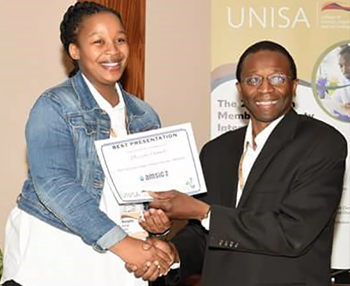
Nozipho Gumbi receives her certificate for the best presenter award (1st prize) from Dr Abdoulaye Doucouré (AMSIC President) at the recent African Membrane Society International Congress (AMSIC-2) held at Unisa.
What has been the greatest challenge you have faced in your career to date?
So far, I have not faced any great challenges as I am still in the early stages of my career. One thing though, that has always been a bit of a bump in the road and not so easy is having to leave my family behind for lengthy periods as part of international student exchange programmes. While the international visits are no doubt good for my career and growth, there is always that bit of guilt. My family is supportive though as they understand that it is for a greater future good.
What advice would you offer young learners who are interested in pursuing your career path?
As clichéd as it may sound, one piece of advice that I would give is that one needs to work extra hard and practise math and science subjects daily. Both of these subjects are entry points for higher education qualifications that will eventually lead one to a career in research or research-related activities. If there is something you do not understand, do not be afraid to seek help.
What does the future hold for your particular field of study as a whole?
Latest research focus is aimed at taking the research work from lab scale to pilot and industrial scale. However, a lot of optimisation and toxicity testing is currently ongoing to ensure that the nanomaterials that we use to modify physicochemical and performance properties of our membranes do not leach out and cause secondary contamination in treated water sources. Particularly because there are many toxicity and environmental concerns regarding the release of nanomaterials, it is important for us to ensure that the materials we produce do not cause any harm or danger to the environment prior to industrial or large-scale application.
Who would you say has been the most help in your career? How did they help you?
Firstly, my immediate family members have played a crucial role in supporting me and being very understanding of the career that I have chosen; that it takes a lot of hard work and dedication and most importantly a lot of time away from them to pursue my studies. There are many others who have asked, “You have been studying since forever; will you ever work?”
Secondly, my PhD supervisors, from Professor Bhekie Mamba, who spotted potential in me much earlier during my first years of tertiary education when I had minimal understanding of a career in research and academia. He has been tracking my progress to date, despite the demanding commitment that his academic position requires. He goes beyond being a supervisor to being my academic father – one who is always looking out for my best interests and whom I believe sees a much brighter future for me than I do for myself.
Then there are Professors Edward Nxumalo and Sabelo Mhlanga who supervised me from my B-tech degree all the way through to PhD. They have shaped and moulded the researcher that I am today; as someone who not only pays attention to finer details but also strives for competence and excellence in all that I do.
Finally, to Professor Jianxin Li, who supervised me while on a research visit to Tianjin Polytechnic University in China last year (2017). He has been instrumental in instilling in me work skills and the ability to see beyond my potential. He works around the clock, still wears a lab coat, goes to the lab at the age of 52 and expects the same from his students. There is just so much one can learn from him!
What exactly does the word ‘success’ mean to you?
To me success means achieving set goals, at the right time while staying in my own lane and not worrying or stressing about the achievements of others around me. It means being able to do things that put a smile on mom’s face and helping her out financially and her in return saying uNkulunkulu akubusise, kwande la othathe khona, which means May God bless you and multiply your blessings. May God keep her for the longest time until I’m able to thank her properly.
*Interview by Thembeka Ntuli-Mpapama
Publish date: 2018-08-14 00:00:00.0


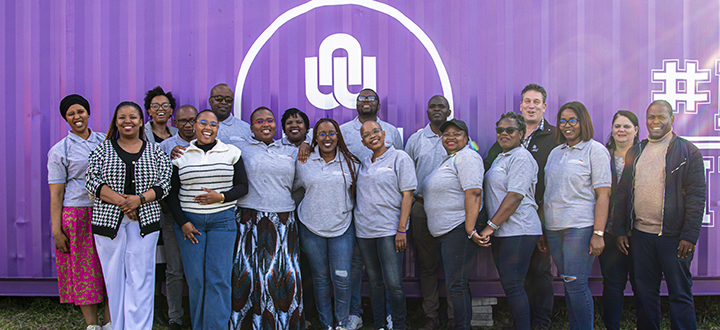 A giant leap for student success and retention
A giant leap for student success and retention
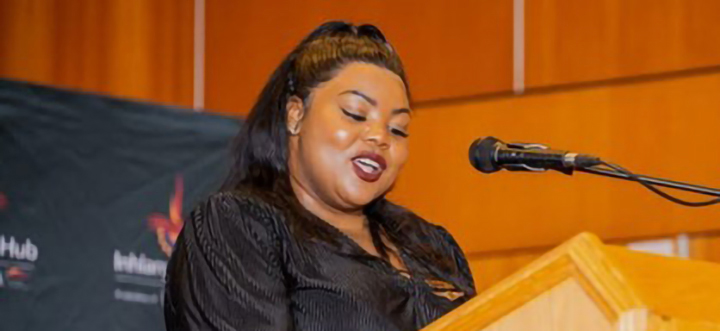 SWEEP: Where women entrepreneurs take the lead
SWEEP: Where women entrepreneurs take the lead
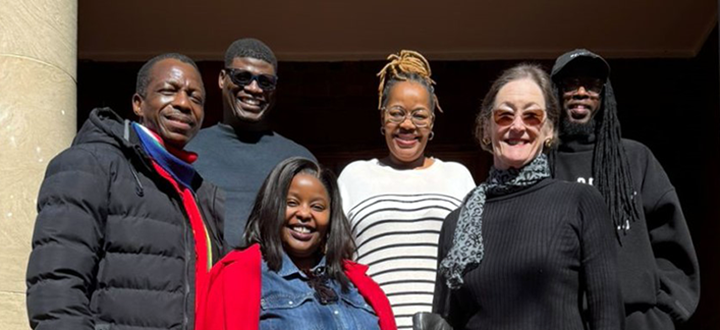 A sense of belonging and excellence nurtured through collaboration
A sense of belonging and excellence nurtured through collaboration
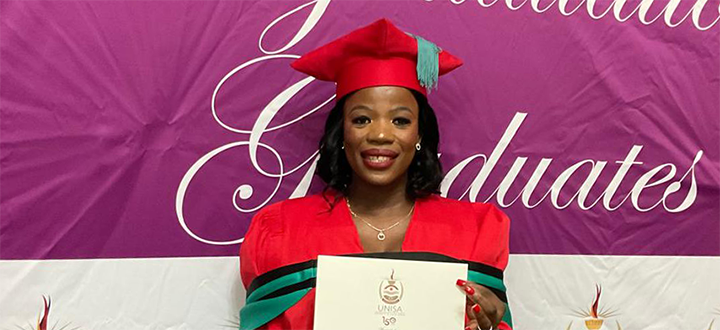 Wielding her Unisa PhD, Botswana educator champions early childhood development
Wielding her Unisa PhD, Botswana educator champions early childhood development
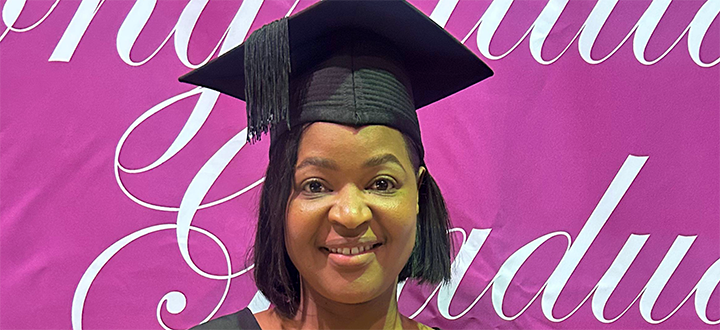 Proud Unisa alumna bridges distance and fuels career growth
Proud Unisa alumna bridges distance and fuels career growth